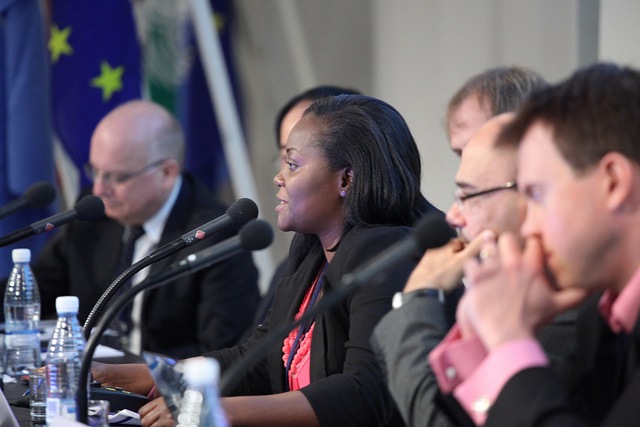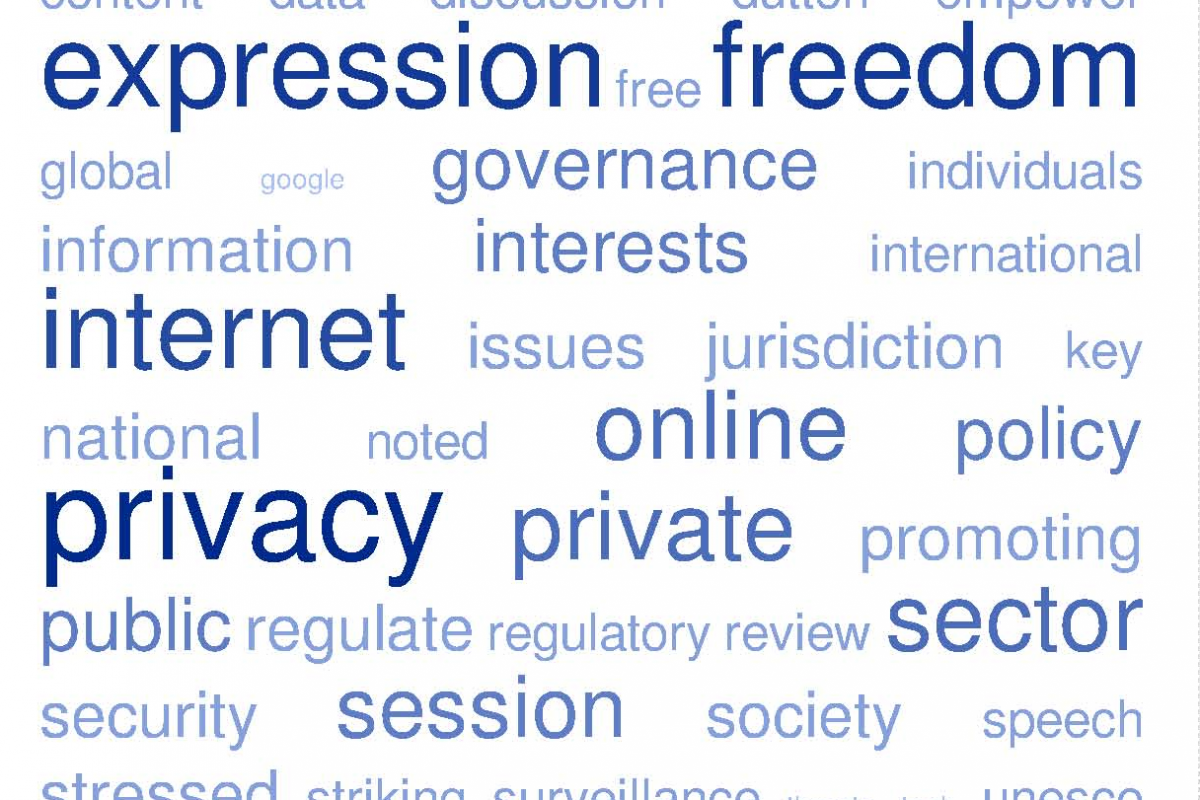The internet and indeed social media plays a key role in improving communication between citizens, government-to-government interactions and at government-to-citizen level. Social media, such as Facebook, Twitter, YouTube, Instagram and MySpace, has the potential to improve governance and democracy practices.
Accordingly, the Uganda government through the National Information Technology Authority Uganda (NITA-U) has developed guidelines to “to facilitate secure usage of social media (Facebook and Twitter etc.) for efficient exchange of information across Government Ministries, Departments and Agencies (MDAs) as well as improving effectiveness of communication, sharing of information and open engagement and discussions with the public.”
On November 28, 2013 Leonah Mbonimpa, the Corporate Communications Officer at NITA-U spoke to CIPESA about the thinking behind the guidelines.
Q. What is the background to developing these guidelines?
A. Government has decided to utilise new channels to communication such as social media to communicate to citizens and give timely responses to emerging issues. In this vein, NITA-U was requested to develop guidelines to help government agencies to embrace social media while maintaining the same level of decorum as with traditional media.
Q. Why did the government find it necessary to draw up these guidelines?
A. Traditionally, Government agencies have been communicating through accounting officers such as Permanent Secretaries. The advent of new media channels and the quest for speedy provision of information has necessitated the shift from traditional approaches to more flexible ways of communicating, [such as] using social media. Given that social media is relatively new and comes with a higher degree of responsibility when communicating, it was necessary to provide guidelines for government agencies to ensure that we communicate [appropriately].
Q. What do the guidelines intend to achieve?
A. They intend to achieve uniformity in communicating and ensure appropriate consultation is made before posting government communication online.
Q. How is users’ privacy protected in these guidelines?
A. The guidelines do not infringe on user privacy. They only seek to standardise the government’s approach to communicating to citizens online.
Q. Are there other initiatives in place or under development by government to protect freedom of expression and privacy online.
A. NITA-U is in preparatory stages of drafting a Data Privacy bill which will eventually be enacted into law to comprehensively address privacy issues.
Further details about the guidelines are available here http://www.nita.go.ug/index.php/features/315-socialmediguide
Improving eGovernment Initiatives: A Global Concern
By Lillian Nalwoga
At the end of May, Finland hosted an international conference to discuss ways of improving eGovernment programmes. In particular, the conference attended by Government Chief Information Officers (CIO) and other officials from across the world reviewed the role of leadership in e-government development.
While noting immense advancements in eGovernment, particularly in the European Union (EU), delegates at the ‘Leading the way in eGovernment development’ conference highlighted numerous factors hampering effective implementation of eGovernment strategies both in developed and developing countries.
According to a May 28, 2013 European Commission press release (see: ‘eGovernment improving but citizens ask for more), almost half (46%) of EU citizens go online to look for a job, use the public library, file a tax return, register a birth, apply for a passport or use other eGovernment services. In addition, 80% indicated that using online public services saves them time, while 76% like the flexibility of the services and 62% said they save money when they use e-services.
Despite these positives, European governments still believe that public perception of governments and public institutions is still low and likely to worsen, stated the press release. Factors cited as constraining eGovernment included: inadequate capacity by some CIOs to implement eGovernment strategies, inadequate trust citizens have in some eGovernment systems, ineffective technological systems, inadequate open, transparent and collaborative efforts by governments, and limited availability of cross-border eGovernment services. According to the UN eGovernment survey 2012, for Africa and other developing regions, the above realities, in addition to the lack of e-infrastructure, mean that eGovernment remains at an elementary level.
Paul Timmers, Director of the Sustainable and Secure Society Directorate, DG Connect at the European Commission, noted that these challenges can be solved by governments’ smart use of new Information Communication Technologies (ICTs), adopting new processes and skills sets. In agreement, Ms. Henna Virkkunen, Finland’s Public Administration Minister, noted that ICT is a key element of every government task and new ways of using latest technology like cloud computing must be explored. Nonetheless, she cautioned that ICT should not be an end itself. Governments need to find ways to use inclusive technology in a manner that benefits them and their citizens, as citizens are demanding for better, user friendly and practical e-services.
In addition, governments also need to include third party users in the design, development and delivery of e-government services such as open data. Mr. Timmers remarked that the “market value of Open Public Data” in EU countries alone is estimated at 140 billion Euros. According to the Open Government Partnership, the market value of Open data can be realised in three main channels – business innovation (making scientific research works more accessible hence driving innovation capacity in fields such as pharmaceutics and renewables); business creation (creating a new market as business can build new innovative applications and eServices based government data); and business efficiency (business and public bodies contributing to ‘smart’ growth by becoming more efficient in tackling citizens’ and customers’ needs by gaining precise and completer insight into citizens’ and customers’ preferences and needs).
But how do governments build positive perceptions of their citizens toward eGovernment? Ian Goldin, Director of the Oxford Martin School and Professor of Globalisation and Development at Oxford University, stated that in order to achieve this, governments have to build trust in the systems; address user privacy concerns; play a stronger role in regulatory frameworks; involve youth and the elderly in digital government and invest in latest technologies as older ones become difficult to work with.
Besides advancements in eGovernment, conference delegates discussed global related concerns such as openness and freedom on the internet as well as data protection. They called for immediate government attention to protecting citizens’ rights while considering the opportunities and benefits of private sector companies that provide online services in the “networked” era where multi-national players like Google, Facebook, Twitter, Amazon, and Yahoo have their own rules on how to handle customer data.
Further, the conference called for common efforts in capacity building for e-government development; sharing best practices to learn from each other; strengthening ethical behaviour in governments to pave way for a culture of openness and the adoption of political will in practicing openness. Other suggestions included the EU issuing directives to all its member countries to open up public data as well as the UN adopting a global framework on promoting openness.
The conference, which took place on May 28–30, 2013, was organised by the United Nations Department of Economic and Social Affairs (UNDESA) and Finland’s Ministry of Finance in collaboration with the European Commission.
More information about the conference is available here.
Balancing Freedom of Expression And Privacy
Striking a balance between freedom of expression and privacy on the internet was the focus of a panel discussion at a review of one decade after the World Summit of the Information Society (WSIS). The WSIS+10 Review meeting took place at the UNESCO headquarters in Paris, France, February 25-27, 2013.
What convergences and tensions exist between freedom of expression and privacy online? What are the implications of approaching the balance between free expression and privacy from a freedom of expression–centric point of view? What actions can governments, civil society, media and the private sector take to balance privacy with freedom of expression online? And what is the best way to empower users? These are some of the questions addressed at the session on ‘Promoting of Freedom of Expression and Privacy Online’. CIPESA’s Lillian Nalwoga was the remote moderator for the session.
The session built on earlier discussions held at the 7th Internet Governance Forum (IGF) in Baku, Azerbaijan on promoting both freedom of expression and privacy on the internet. It also drew from the Global Survey of Internet Privacy and Freedom of Expression – a UNESCO 2012 publication – which highlights a diverse international regulatory landscape, and the challenges posed by discrepancies in laws pertaining to the online and off-line spheres, and between national and international jurisdictions.
During the session, Pranesh Prakash from the India-based Center for Internet Society stressed the need for more relaxed regulations to govern the conduct of the private sector. He noted that “one must give the private sector enough leeway to safeguard them from responsibility for users’ actions and the requirement of taking down reasonable speech.” However, he added that the commercial sector has divergent interests and they do not necessarily align with public interests.
According to him, differing public and private sector interests coupled with unenforceability of self-regulation mechanisms and the jurisdictional issues of the internet mean that the conflict between freedom of expression and privacy cannot be easily resolved through public policy options that are only aimed at the private sector.
Patrick Ryan, a Policy Counsel from Google who was also a panelist, argued that the move to the “cloud” brings with it both enhanced privacy and security benefits, while at the same time putting data potentially at risk. Noting that government surveillance remained one of the biggest threats to privacy, he stressed that the private sector needs to share more information on government take down requests that violate individuals’ privacy and free speech.
Meanwhile, William Dutton, a professor of Internet Studies at Oxford Internet Institute, stressed the importance of recognising the power of the internet in empowering networked individuals and enabling freedom of expression, like never before. He cautioned that if nations do not approach the issue of striking a balance between freedom of expression and privacy appropriately, some of the key benefits of the internet may be lost. He noted that whilst some nations have taken progressive steps, many others are moving in the wrong direction and various global policy choices are increasingly restricting freedom of expression.
Indeed, this has been illustrated by worldwide trends towards more content filtering and censorship. Dutton said adopting inappropriate models for internet governance and regulation, such as disproportionate levels of surveillance in the name of security, reliance on intermediaries to regulate content, and assertion of national sovereignty and jurisdiction in the online world are threatening privacy and freedom of expression.
Key recommendations from this session were: avoiding a moral panic over privacy; creating widespread awareness of issues concerning privacy and data protection among users especially the young generation; updating policy and regulatory frameworks that address freedom of expression and privacy online; and having a clear definition on national security interests.
For more information, please visit – https://www.unesco-ci.org/cmscore/events
Promoting of Freedom of Expression and Privacy Online
Follow WSIS+10 on twitter at #WSIS



